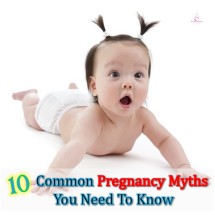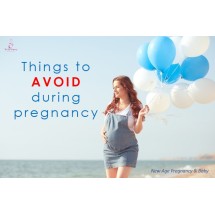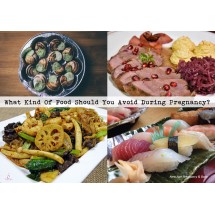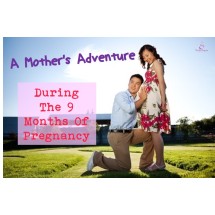During pregnancy, the mother’s body plays an additional role to support the healthy development of the fetus. While a well-balanced and varied diet is important, it may not be possible to incorporate all the additional nutrients that are required during pregnancy. Folic acid, calcium, iron and certain prenatal vitamins may be prescribed by the doctor and for some of these, studies have shown evidence of reducing the chance of miscarriage. Let’s review these common supplements and the studies on them.
#1 Folic Acid
Folic acid, also known as folate, is a B vitamin supplementation that is commonly prescribed from about a month before conception (or immediately after conception) to twelve week’s gestation. Folic acid is critical for fetal development of the spinal cord and brain to prevent neural tube defects. Folic acid is also needed to support cell production. The recommended dosage (by the American College of Obstetricians and Gynecologists) is 400 micrograms per day. If you are already taking a multivitamin, do not assume that it has sufficient folic acid. It is best to show your doctor the multivitamin you’re taking and ask for his recommendation.
Foods that are also high in folic acid include leafy green vegetables, citrus fruits and beans.
From a study published in May 2016¹, there was no evidence of any difference in the risk of total fetal loss between women supplemented with or without folic acid. However, another study in 2015² associated higher intake of folate with reduced risk of spontaneous abortion. Given that folic acid is established to prevent neural tube defects with possible reduction in miscarriage, it is regularly prescribed during early pregnancy.

#2 Iron
Iron is required to make hemoglobin in red blood cells that transport oxygen and prevent anemia. It is also associated with a lower risk of premature births and low weight babies³. As the amount of iron required during pregnancy is typically more than what would be in a regular diet (almost twice compared to that needed for non-pregnant woman), iron supplements are often prescribed (some doctors may prefer to screen for anemia before deciding on the prescription of iron supplement). The recommended amount of iron required per day is about 27 milligrams. Most prenatal vitamin supplements contain iron, and also foods such as lean red meat, fish, beans and iron-fortified cereals. Iron can be more easily absorbed into the body when taken with vitamin-C rich foods. Iron, however, may contribute to constipation – be sure to drink enough water!
From a study published in May 2016¹, there was evidence that women receiving multivitamins plus iron and folic acid had reduced risk for stillbirth.
#3 Calcium and Vitamin D
Calcium is required for the development of baby’s bones and teeth (particularly in the third trimester), and also for the mother’s calcium needs. Vitamin D is also required for calcium absorption, for healthy skin and eyes and associated with reduced risk of preeclampsia. The recommended amount is about 1,300 mg of calcium and 600 international units of vitamin D daily. Although most multivitamins contain calcium and vitamin D, it may not have sufficient amounts hence it is best to check with your doctor (also too high level of vitamin D can be toxic3). Milk and other dairy products, such as cheese and yogurt, broccoli, dark leafy green and salmon contain calcium and/or vitamin D.
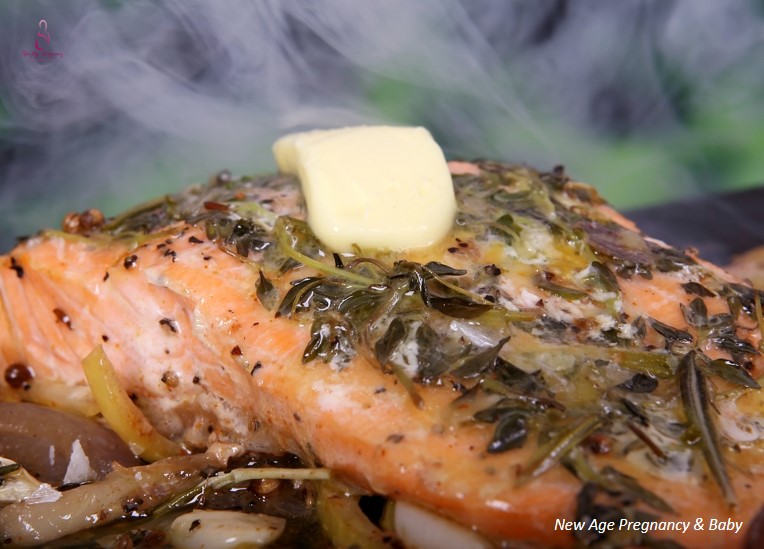
#4 Omega-3
Omega-3 fat docosahexaenoic acid (DHA) has several benefits, for the baby’s brain and vision development and for strengthening of the immune system (through lowering inflammation and allergy risk). While fish are excellent DHA sources, choose those that are lower in mercury such as salmon and pollock (and avoid swordfish, shark, king mackerel and tilefish). Mercury has been linked to birth defects. The recommended dosage by American Pregnancy Association is 300 mg of DHA daily for pregnant and breastfeeding women.
#5 Vitamin C
Vitamin C aids cell development and can be obtained from fruits and vegetables such as citrus fruits, broccoli, bell peppers and tomatoes. From a study in 2016¹, there was no difference in the risk of total fetal loss between receiving vitamin C compared with no vitamin C.
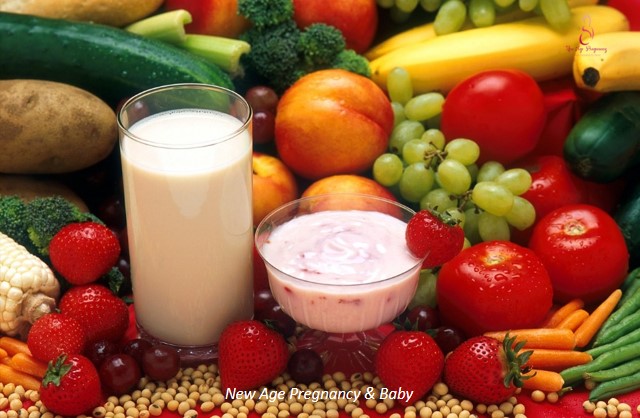
#6 Vitamin A
Vitamin A is essential for baby’s cell growth, including eye, heart, limb and ear development, healthy skin and mucous membranes and bone growth. Beta-carotene is a safer form of vitamin A than retinol which has been associated with birth defects. Limit supplemental vitamin A to 5,000 international units a day. From a study in 2016¹, there was no difference in the risk of total fetal loss between receiving vitamin A compared with no vitamin A.
#7 Multivitamins
From a study in 2016¹, there was evidence of a decrease in the risk for stillbirth among women receiving multivitamins plus iron and folic acid compared with only iron and folate. However, not all multivitamins are safe and it is best to check with your doctor for his recommended prenatal multivitamin. The intake of all-in-one multivitamin just few weeks before pregnancy should be consulted with your doctor, particularly as there was also a study in 20144, that associated multivitamin with a modest increased risk of early miscarriage.
It is best to check with your doctor on the recommended supplements to take during pregnancy and to also show him the supplements that you have been taking. It is quite possible that you may over-consume certain supplements if you take both prenatal vitamins in addition to your existing ones. On the other hand, relying on diet alone may not give you sufficient nutrients during your pregnancy. While the relationship between prenatal vitamins and miscarriage risk is not firmly established in studies, ensuring a well-balanced diet with appropriate supplements that are needed during pregnancy remain an important part of prenatal care.
Written by Mei
References:
1. Balogun OO, da Silva Lopes K, Ota E, Takemoto Y, Rumbold A, Takegata M, Mori R. Vitamin supplementation for preventing miscarriage. Cochrane Database of Systematic Reviews 2016, Issue 5. Art. No.: CD004073. DOI: 10.1002/14651858.CD004073.pub4.
2. Audrey J. Gaskins, Janet W. Rich-Edwards, Russ Hauser, Paige L. Williams, Matthew W. Gillman, Elizabeth S. Ginsburg, Stacey A. Missmer, Jorge E. Chavarro. Obstet Gynecol. Author manuscript; available in PMC 2015 Jul 1.
3. COLLEEN KIRKHAM, M.D., SUSAN HARRIS, M.D., STEFAN GRZYBOWSKI, M.D., Evidence-Based Prenatal Care: Part I. General Prenatal Care and Counseling Issues. Am Fam Physician. 2005 Apr 1;71(7):1307-1316.
4. Nohr EA, Olsen J, Bech BH, Bodnar LM, Olsen SF, Catov JM. Periconceptional intake of vitamins and fetal death: a cohort study on multivitamins and folate. International Journal of Epidemiology. 2014;43(1):174-184. doi:10.1093/ije/dyt214.


